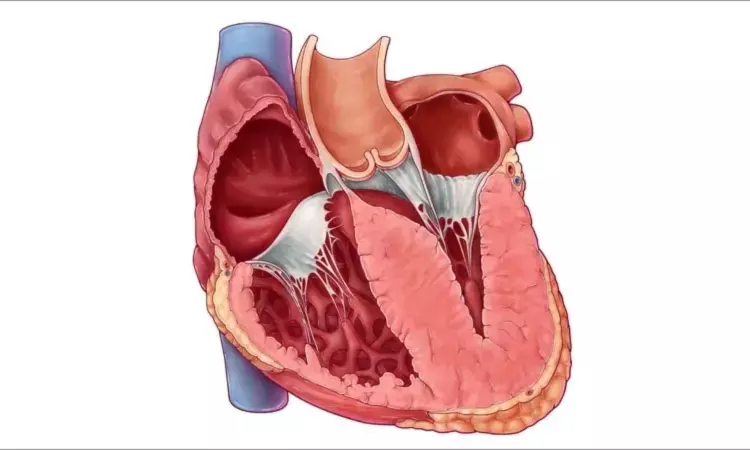- Home
- Medical news & Guidelines
- Anesthesiology
- Cardiology and CTVS
- Critical Care
- Dentistry
- Dermatology
- Diabetes and Endocrinology
- ENT
- Gastroenterology
- Medicine
- Nephrology
- Neurology
- Obstretics-Gynaecology
- Oncology
- Ophthalmology
- Orthopaedics
- Pediatrics-Neonatology
- Psychiatry
- Pulmonology
- Radiology
- Surgery
- Urology
- Laboratory Medicine
- Diet
- Nursing
- Paramedical
- Physiotherapy
- Health news
- Fact Check
- Bone Health Fact Check
- Brain Health Fact Check
- Cancer Related Fact Check
- Child Care Fact Check
- Dental and oral health fact check
- Diabetes and metabolic health fact check
- Diet and Nutrition Fact Check
- Eye and ENT Care Fact Check
- Fitness fact check
- Gut health fact check
- Heart health fact check
- Kidney health fact check
- Medical education fact check
- Men's health fact check
- Respiratory fact check
- Skin and hair care fact check
- Vaccine and Immunization fact check
- Women's health fact check
- AYUSH
- State News
- Andaman and Nicobar Islands
- Andhra Pradesh
- Arunachal Pradesh
- Assam
- Bihar
- Chandigarh
- Chattisgarh
- Dadra and Nagar Haveli
- Daman and Diu
- Delhi
- Goa
- Gujarat
- Haryana
- Himachal Pradesh
- Jammu & Kashmir
- Jharkhand
- Karnataka
- Kerala
- Ladakh
- Lakshadweep
- Madhya Pradesh
- Maharashtra
- Manipur
- Meghalaya
- Mizoram
- Nagaland
- Odisha
- Puducherry
- Punjab
- Rajasthan
- Sikkim
- Tamil Nadu
- Telangana
- Tripura
- Uttar Pradesh
- Uttrakhand
- West Bengal
- Medical Education
- Industry
Young children with HCM benefit from similar management strategies as older children: JACC

UK: Early-onset childhood hypertrophic cardiomyopathy (HCM) (before 12 years) bears a similar symptom burden and cardiac phenotype compared to patients presenting later in childhood (≥12 years of age), says a recent study. Also, there was no difference in the incidence of sudden cardiac death (SCD) and mortality. However, patients presenting younger than 12 years were more likely to have a myectomy but less likely to have a primary prevention ICD.
About half of childhood sarcomeric hypertrophic cardiomyopathy is presented before the age of 12 years, but there is no systematic characterization of this patient group. Considering this, Gabrielle Norrish, Centre for Inherited Cardiovascular Diseases, Great Ormond Street Hospital, London, United Kingdom, and colleagues aimed to describe the clinical presentation and natural history of patients presenting with nonsyndromic HCM before the age of 12 years in their study published in the Journal of the American College of Cardiology (JACC).
For this purpose, the researchers collected data from the International Paediatric Hypertrophic Cardiomyopathy Consortium on 639 children diagnosed with HCM younger than 12 years. They were compared with 568 children diagnosed between 12 and 16 years.
The study led to the following findings:
- At baseline, 53.6% of patients had family histories of HCM, 20.9% had heart failure symptoms, and 39.2% were prescribed cardiac medications.
- The median maximal left ventricular wall thickness z-score was 8.7, and 27.2% had left ventricular outflow tract obstruction.
- Over a median follow-up period of 5.6 years, 6.6% died, 3.3% underwent cardiac transplantation, and 10.8% had life-threatening arrhythmic events.
- Compared with those presenting after 12 years, a higher proportion of younger patients underwent myectomy (10.5% vs 7.2%), but fewer received primary prevention implantable cardioverter-defibrillators (18.9% vs 30.1%).
- The incidence of mortality or life-threatening arrhythmic events did not differ, but events occurred at a younger age.
"This study supports the notion that preadolescent patients should not be considered a distinct entity for risk stratification and that similar management strategies as used in older patients with HCM should be used," the researchers concluded.
Reference:
Dr Kamal Kant Kohli-MBBS, DTCD- a chest specialist with more than 30 years of practice and a flair for writing clinical articles, Dr Kamal Kant Kohli joined Medical Dialogues as a Chief Editor of Medical News. Besides writing articles, as an editor, he proofreads and verifies all the medical content published on Medical Dialogues including those coming from journals, studies,medical conferences,guidelines etc. Email: drkohli@medicaldialogues.in. Contact no. 011-43720751


